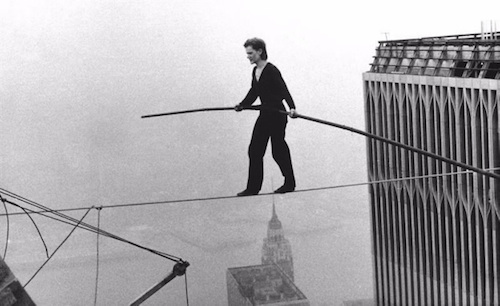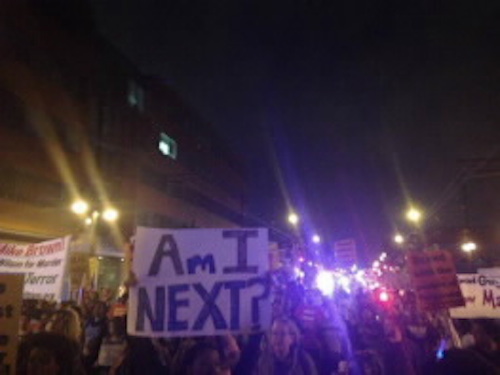Meet the 'Boys' and 'Girls' on de Battlefront
On Labor Day, I wrote as a status update:
We live in volatile times, yes. But creative and productive ones as well. Keep that in mind as the number of crises increases. The tightrope is not a metaphor; it's where we all are, between our grand intentions and the air.

And on that tightrope, there is a great deal of physical work. I often forget the physical work of poetry. Whether typing on a computer or writing in long hand, the digits, the shoulders, your thighs, and internal organs have to work well in very concentrated way and it can hurt. I am hurting. The world is hurting. And yet, butterflies drink nectar, frogs make a lot of noise, children play. The butterflies, frogs and children are all in jeopardy and it hurts to know that.
I am not an economist. I do not play one on TV. But the economy as set up serves fewer and fewer people even as more of us have stuff: computers, cell phones, thermos for the endless cups of coffee that is to keep us awake so that we can continue to work for less and less pay. And while we are paid less, human life too is losing value. Why, for instance were there fewer than 100 doctors in all of Liberia before the Ebola outbreak—because it is not worth it for educated Liberians to live and work in Liberia. Why are so many Nigerians—smart, well-educated, entrepreneurial in London and New York and Chicago and not in Lagos—because it is not worth it live and work in Lagos. Why is that public service workers in this country are paid less and less while the need for their services as teachers, nurses, social workers grows? Yeah, I could give you a laundry list of reasons starting with the un-yielding response to social change by local, state and national right wing Republicans. But you know that’s too easy. While I can rant with the best of them, I rather enjoy this deliciously bitchy poem by Mark Bibbins—originally published in Connations Press (scroll down to "Terminal," the second poem).
So you were expecting a poem about Ferguson, MO or Obama haters? I have them, but sometimes I get tired of being that pushy bitch; the shameless hussy. So Mark gets to be the bitch this time:
Sickness draws a salary,
some fake liberation
and a boarding pass
printed on cheap-ass paper.
What have American poets and artists given up in order to maintain some modicum of comfort and dignity in this country? Does anyone even try for dignity? Truth. Honesty. The capacity to behave badly? You can get on that jet plane, but the boarding pass is printed on cheap-ass paper and where you go to is built with money from people who are most likely arming the Islamist Caliphate.
As a poet who is all too used to living in volatile times, I appreciate Bibbins love of calamity. He seeks the “kaboom” or at least recognizes why those who seek them do. He’s not dodging the obvious. He sometimes shows. He sometimes tells. Strange that this paper becomes “human paper” in the version of the poem in Bibbins’s They Don’t Kill You Because They’re Hungry They Kill You Because They’re Full. Also, the wonderful lines:
Give me my minimum
rage, a basket half
full of stunted puns;
we pull some wealth
from lyric poverty,
I enjoyed what is the case for rage against the prevailing wages that poets, even ones with good jobs put up with. And yes, the poem is about mortality, loss, but its deep anger is justified. I know that revision is important and Bibbins is one very solid, enraged, engaged and language obsessed poet, but his earlier version caught something harsher than the poem in the book.
But more importantly, the last lines remain. We cannot live in “kaboom.” The Syrians, the Gazans and Israelis, the citizens of Northern Nigeria and the citizens of Ferguson, Missouri have had enough of “kaboom.” We really are in volatile times. We really don’t know which way is up. But we know what truly is down.
And we really have come to terms as poets, as citizens, on what we need to do to not fall into nihilism and dystopia—easy choices, like vaporize me, okay.
When things get so thick and ridiculous in terms of the ways in which we as citizens are treated or act, I revisit the great title essay from Civil Wars by June Jordan. I know that if June were alive or Lorenzo Thomas or Jayne Cortez, they would be advising the young uns to get on with the resistance to and the development of power. None of these poets lived in ivy towers, although they all liked good food, drink, company, and fine clothes. Jordan understood how power is used and how to use it.
Civil Wars concerns itself not only with the challenges of organizing, but also with issues of alliances—how they shift when differing groups require different ways to wrestle with or manifest power and ultimately with communication—it’s fragility and how vulnerable we are to lack of understanding or denial. And it provides a premier to how to respond to the media which lacks understanding and seems to be in denial of just how fucking awful the lives of too many poor Black, Brown and yes White people are in these United States. Jordan says “In the context of tragedy all polite behavior is a form of self-denial.” She also points out that “the courtesies of order, of ruly forms pursued from a heart of rage or terror or grief defames the truth of every human crisis." (my italics)
I was deeply heartened and excited that Metta Sáma and other younger poets, writers, activists took to the streets and social media in response to the murder of Michael Brown. On top of the murders of Trayvon Martin and so many other young men and women of color over the past few years, how could they not. The facebook group: Artists Against Police Brutality/Cultures of Violence was able to get over 1,000 “likes” in a few hours and it serves as a platform for actions across the U.S., and to work with activists in Missouri. It is one of many such projects. It is deeply dis-courteous.

For much too long, there has been a bad rap on “political poetry” as if it could only be made by people who were all too often the targets of police misconduct or sexual deviancy. You know “those” people and their problems. Well the militarization of police forces across this nation is OUR problem. The lack of economic mobility is OUR problem. Allowing too few people to have power in the academy, in Congress, in industry is OUR problem. And it does not matter whether you are a “theory” poet; a “queer” poet; a “formalist” poet; or what, these problems are not going to go away. And as long as the language used to critique these issues remains on the tongues of policymakers, we are doomed. We are poets. Language is our business, our craft, our raison deter. And now is not the time to hide behind theory or fear or whatever. Because as Robert Hass, the former poet laureate knows all too well, a policeman’s truncheon does not stop at your literary achievements. We need to create language that not only expresses the volatility of these times in whatever ways it can, but also to think about language that takes us somewhere else, another, better place.
When Rachel Zucker and Arielle Greenberg asked 100 poets to write poems for Starting Today: 100 Poems for Obama’s First 100 Days, I ended my contribution “what the fates allow” thusly:
No President, no matter his heart’s strength and his mind’s
Obsidian edge can do what we all must do.Seek Lachesis’ wisdom. Beg the spinner’s forgiveness.
Offer up our desire for a world made whole
With threads from a stronger more flexible fabric,Illuminated, our future shared differently.
As a kind of spider woman, I know that we are deeply connected. That the “we” has to be expressed, but first we have to make those connections, realize that “we” have a shared future, because if we do not, these ugly times are only going to get uglier and our capacity to make language that names our condition and moves us forward will be all that more difficult. We need to get pass “kaboom”; we need off the tightrope, we need out of the streets and into places where decisions are made. We need to not only fight the power, but gain it. When all else fails I think of the “Indians” in New Orleans. The battle front is costumed and powered by drink and lust and desire.
Near the end of Jordan’s essay, she says:
It came to me that self-determination has to mean that the leader is your individual gut, and heart, and mind or we’re talking about power again, and its rather well-known impurities. Who is really going to care whether you live or die and who is going to know the most intimate motivation for your laughter and your tears is the only person to be trusted to speak for you and to decide what you will and will not do.
The only leadership I can respect is one that enables every man and woman to be his and her own leader; to abandon victim perspective and to faithfully rely upon the truth of feelings that is his or hers and then to act on that, without apology.
I would go one step further and say we must be leaders together. We must meet those who attempt to suppress us on the battlefront and we must do it with serious anger and a soupcon of joy.

Arkansas born and raised, and a resident of New York City for more than four decades, Patricia Spears...
Read Full Biography

